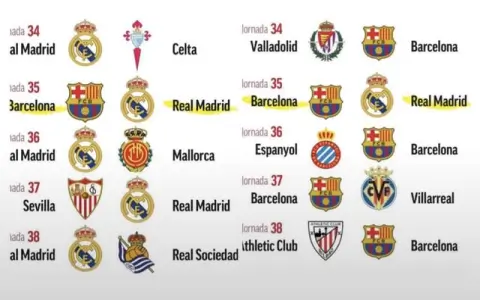That morning, I brewed a cup of coffee as usual and sat at my computer scrolling through my phone. Just then, last night’s La Liga results popped up: Barcelona beat Celta Vigo, 2-1.
My first thought was: “Oh, Barça won. Normal.”
After all, Barça is a powerhouse, consistently ranking near the top of the league. But Celta?They’ve always been a mid-to-lower-tier team, rarely making headlines.
So I didn’t think much of it and was about to close the page to do something else. But just before closing it, I casually clicked on the current La Liga standings to see where each team ranked.
That’s when it suddenly hit me: this match wasn’t ordinary at all.

After Barcelona’s win, I saw they were sitting in second place. While still far from the top spot, the crucial point was—they were still in the “top four.”
Finishing in the top four secures a spot in next season’s Champions League, which is absolutely vital. The Champions League isn’t just about prestige; it brings in a massive amount of money. For Barcelona, facing financial strain in recent years, failing to qualify for the Champions League could mean the club might not even be able to pay salaries.
So for them, winning an ordinary match isn’t about chasing titles—it’s about preserving their income stream. Especially against lower-ranked teams like Celta: a loss or draw means “dropping points,” allowing rivals to catch up and destabilizing their position.
Meanwhile, Celta faces even greater pressure. They sit just three points above the relegation zone.Meaning a few more losses could plunge them into the perilous “potential relegation” zone.
For them, every single point is precious. Even a draw against a strong team offers one more chance to survive. But this time, they lost. Not only did they fail to gain points, but their inferior goal difference pushed them further down the standings.
You see, both teams played the same match, yet their mental states couldn’t be more different.
For Barcelona:
They weren’t fighting for the championship, but for survival. A win brings them closer to the Champions League; a loss could render their entire season’s effort meaningless. This pressure isn’t easily visible to outsiders, but the standings tell the story loud and clear.
For Celta Vigo:
Their situation is even bleaker. Every match feels like an exam—fail, and they’re “held back.” Losing to Barcelona now means failing that test, and they still face other relegation rivals ahead, making the road even tougher. The pressure on players and coaches is unimaginable.
So while this game appears to pit a “strong team against a weak one,” it’s actually a battle for survival and future prospects.
Many football fans focus solely on clashes between giants like Real Madrid, Barcelona, and Atlético Madrid—the “El Clásico” or “Madrid Derby.” Those matches are undeniably thrilling, packed with stars and talking points.
But games like Barcelona vs. Celta seem less exciting and get minimal media coverage. Yet it’s precisely these “unremarkable” matches that often decide who stays and who goes at season’s end.
Especially in the latter stages of the season when points are tightly contested. Sometimes, a seemingly easy win can give a team breathing room; while an unexpected loss can plunge another into despair.
Before, I watched matches mainly to see who scored or played well—just for fun. But after checking the standings this time, I truly understood:
- Football isn’t just a game—it’s about money, jobs, futures, and survival.
Barcelona’s win wasn’t just three points; it secured hundreds of millions in Champions League revenue.
Celta’s loss wasn’t just three points dropped; it brought them closer to relegation.
You won’t hear this during the broadcast, but glancing at the standings lets you feel the tension.
I also checked their recent form:
- Barcelona has been fighting hard to win every game lately, never letting up even against weaker opponents.
- Celta hasn’t won in five straight matches. The players look exhausted, the coach has changed tactics, but they still can’t get points.
This gap isn’t about skill—it’s about mentality and resources.
Now I understand why some say “La Liga is the hardest league to predict.”
Because here, no match is truly safe.
Powerhouses fear dropping points; underdogs dread defeat. Every single point can alter destiny.
So next time you see Barcelona or Real Madrid facing an obscure team, don’t assume it’s a walk in the park.
That team might be fighting for survival, while the giants battle for Champions League qualification.
In that moment, it’s not just players on the field—it’s the club’s future, the manager’s job, the fans’ hopes.
One game can decide an entire season’s fate.
That’s why football is never just a game.
It’s real. It’s brutal. But it’s also utterly captivating.

